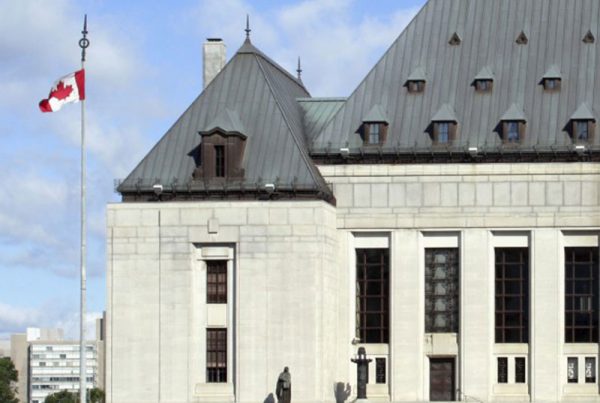Now more than ever, it is crucial for voters to be able to exercise their democratic rights in an informed way. CCLA appeared today as an intervener before the Supreme Court of Canada (SCC) in the Attorney General of Ontario v. Working Families Coalition (Canada) Inc. matter to argue in favor of a broad and purposive interpretation of s. 3 of the Charter, which encompasses the right to effective representation and meaningful participation.
This case concerns the third-party spending limits recently added to Ontario’s Election Finances Act in 2021, and whether they infringe the informational component of the right to vote, which is protected by s. 3 of the Charter. CCLA submitted to the SCC that any limit on the right to vote requires not deference, but careful examination from the courts. That is due to the fact that legislatures of all parties are in a structural conflict of interest when they enact electoral legislation. CCLA further submitted to the SCC that this need for careful scrutiny applies at both the infringement (s. 3) and justification (s. 1) stages of a court’s analysis, including because the right to vote is exempted from the notwithstanding clause.
This case is part of a broader factual framework in which the CCLA has been involved from the very beginning.
In February 2021, Ontario enacted the Protecting Ontario Elections Act, 2021, amending the Election Finances act, RSO 1990. The amendment imposed restrictions on third-party election advertising for an entire year prior to an election. Such rules limit critical democratic discourse as they constrain what individuals and organizations unaffiliated with a political party or candidate can say about public policy issues. Consequently, a coalition comprising labour unions and individuals (Working Families Ontario), with the CCLA intervening, challenged the amendment, claiming an unreasonable infringement of freedom of expression.
Since the Ontario Superior Court of Justice agreed with the applicants, the Ontario government reenacted the rules, invoking the notwithstanding clause. This clause of the Charter unfortunately allows laws to operate even though they violate Charter-protected rights and freedoms.
Subsequently, Working Families Ontario mounted a second challenge, asserting that the rules unreasonably violate the right to vote, a democratic freedom that cannot be overridden by the notwithstanding clause. The CCLA once again intervened, highlighting the self-interested nature of election law changes that can benefit incumbent candidates. In December 2021, the Ontario Superior Court of Justice found that the spending restrictions did not breach democratic rights. However, in March 2023, the Ontario Court of Appeal reversed the decision, finding the third-party spending limits overly broad. In November 2023, the SCC agreed to hear the Attorney General of Ontario’s appeal, and in April 2024, CCLA was granted leave to intervene.
CCLA is grateful for the excellent pro bono representation of David Rankin, Lindsay Rauccio and Graham Buitenhuis of Osler, Hoskin and Harcourt LLP in this matter.
You can read our full factum here.
About the Canadian Civil Liberties Association
The CCLA is an independent, non-profit organization with supporters from across the country. Founded in 1964, the CCLA is a national human rights organization committed to defending the rights, dignity, safety, and freedoms of all people in Canada.
For the Media
For further comments, please contact us at media@ccla.org.





